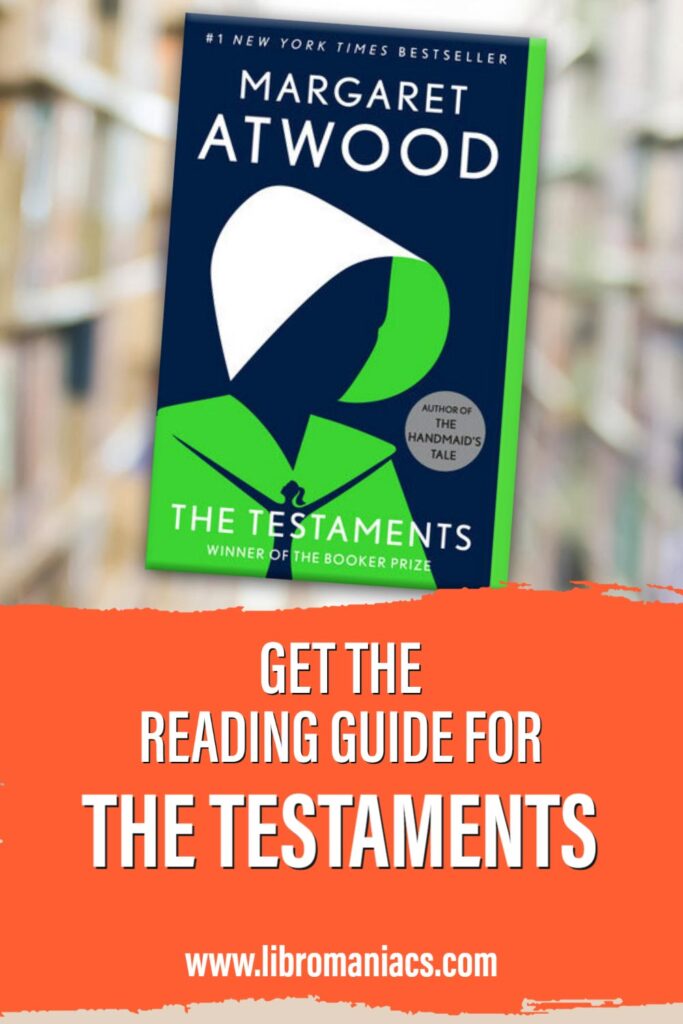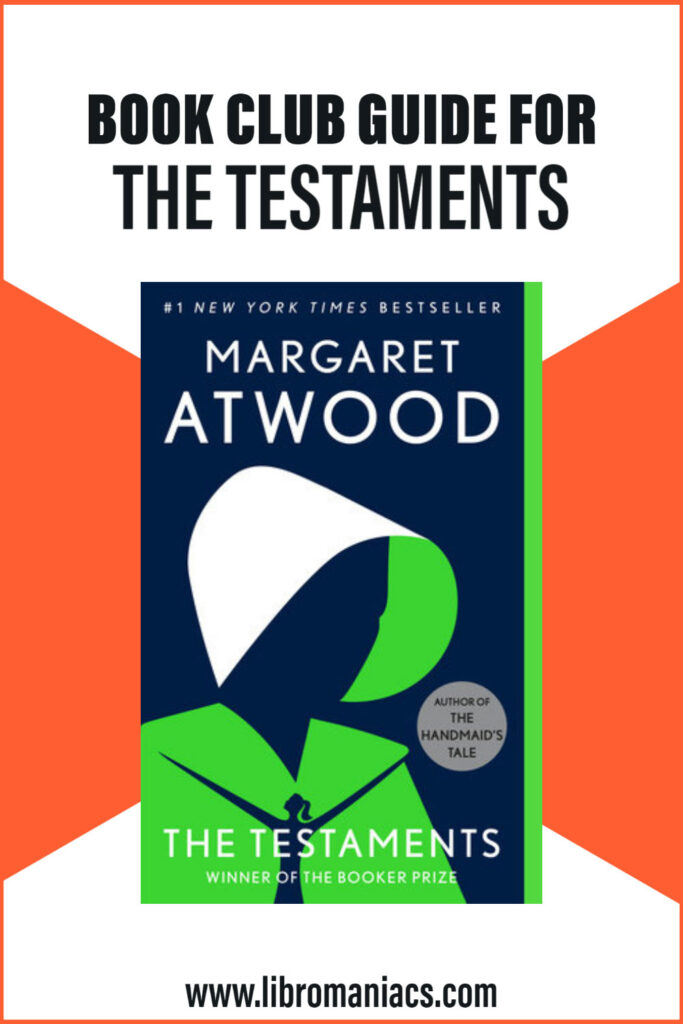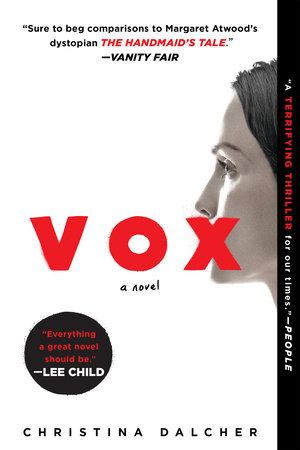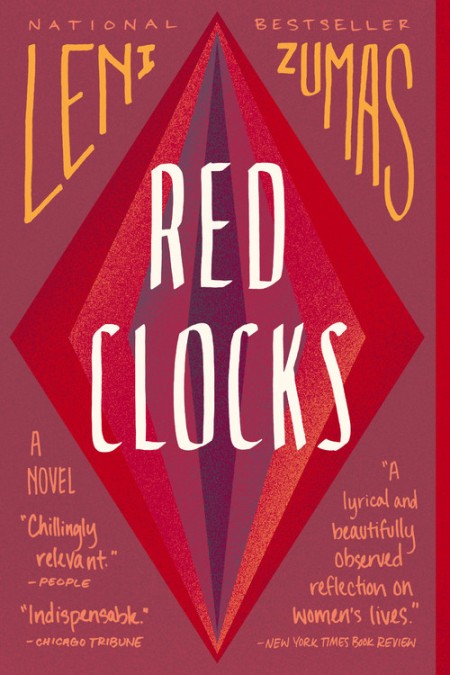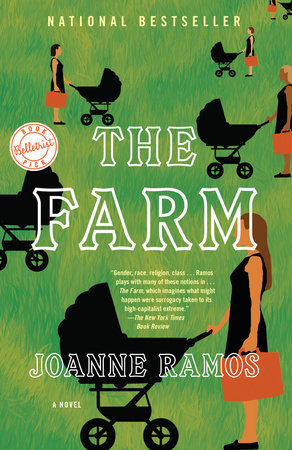Margaret Atwood has done it again. Almost 35 years after The Handmaids Tale was released, Atwood released the sequel, The Testaments. In this novel, readers are invited back to Gilead to see how things have changed since the events of The Handmaids Tale 15 years prior. Read our The Testaments book club questions to jumpstart your next book club discussion.
The Testaments welcomes back familiar faces from the classic novel like Aunt Lydia and Agnus. While dealing with themes of power, knowledge, repression, and religion, The Testaments ties up loose ends left by the abrupt ending of The Handmaid’s Tale.
With this discussion guide for The Testaments, your next book club meeting will be filled with discussion about our current society and women’s place within it. After reading our quick synopsis, start with The Testaments book club questions to dive into a deep discussion about the novel. After this, explore the selected reviews to see if your book club agrees with the criticism or not. Once your conversation is finished, get some more reading ideas with 3 more books like The Testaments.
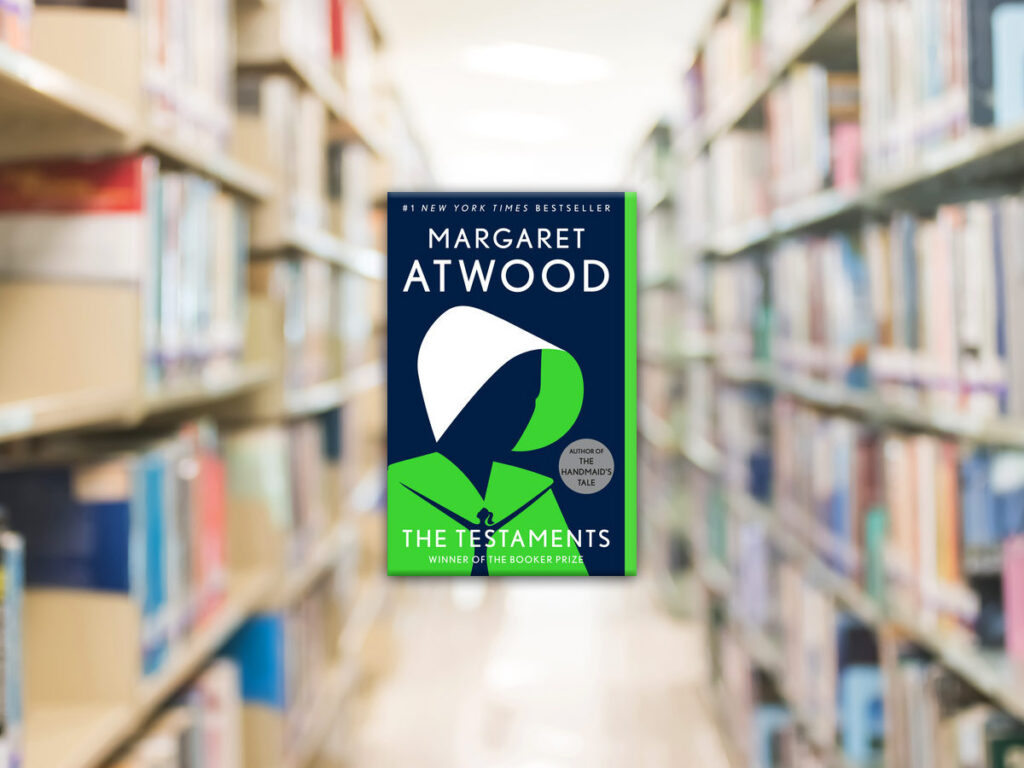
(This article contains affiliate links. This means that if you choose to purchase, I’ll make a small commission.)
The Testaments Synopsis
The Testaments, Margaret Atwood
More than fifteen years after the events of The Handmaid’s Tale, the theocratic regime of the Republic of Gilead maintains its grip on power, but there are signs it is beginning to rot from within. At this crucial moment, the lives of three radically different women converge, with potentially explosive results.
Two have grown up as part of the first generation to come of age in the new order. The testimonies of these two young women are joined by a third: Aunt Lydia. Her complex past and uncertain future unfold in surprising and pivotal ways.
With The Testaments, Margaret Atwood opens up the innermost workings of Gilead, as each woman is forced to come to terms with who she is, and how far she will go for what she believes.
10 The Testament Book Club Questions
- Compare The Testaments to The Handmaid’s Tale. Which did you like better and why? Do you think The Handmaid’s Tale needed a sequel?
- Upon release of this book, author Atwood said, “everything you’ve ever asked me about Gilead and its inner workings is the inspiration for this book… The other inspiration is the world we’ve been living in.” What real-world events do you think author Atwood used as inspiration for her book?
- In The Handmaid’s Tale, we are not told much about Aunt Lydia’s background. Did the background given in The Testaments change your view of Aunt Lydia? Has she redeemed herself by the end of the novel?
- After Agnes is assaulted, she remembers being told that “nice girls did not notice the minor antics of men.” How does this thought process contribute to the oppression of women in Gilead?
- Gilead is a fictional society that survives off the oppression of women. Are there ways the women in Gilead contribute to their own (and their children’s) oppression? Is it even possible for the oppressed to contribute to their oppression?
- Is it possible for a man to be a member of Gilead and be a good person? Why or why not?
- In what ways does Aunt Lydia represent the rise and fall of power?
- Of the three narrators (Aunt Lydia, Agnes, and Daisy/Nicole), whose story did you enjoy the most and why?
- Compare and contrast Agnes and Daisy/Nicole. How are they similar? Where do you see differences? Since they’re sisters raised in two different environments, how does this become a conversation of nature vs. nurture?
- Do you think our society could ever become like Gilead? What could you do to prevent this?
Bonus Question – Come back after reading the following reviews.
11. In what ways does The Testaments as the sequel to the beloved classic hurt its popularity with readers? Are the negative reviews justified? Or are they purely from comparing The Testaments to The Handmaid’s Tale?
Selected Reviews for The Testaments
“So why does Margaret Atwood choose to tell the story again? That question has haunted me since I heard the announcement for this project almost a year ago. WHY?… The Testaments has a different purpose… Don’t accept the unacceptable. Act on injustice. Speak up. Do what has to be done to make the world safer for women and children… No tyranny will last forever if you are brave enough to do your individual bit.”
“It’s not easy being the most anticipated book of the year. I would argue that most of the negative reactions – including my own – are based largely on expectations… Another downer is how many questions this book doesn’t answer. The original ended with such a dramatic cliffhanger, but the unresolved threads remain largely unresolved here… All in all, this is a decent yarn. It’s not going to be a classic, but it’s an okay pop novel.”
“Just because an author can write a novel, does that really mean they should? I thought The Handmaids Tale was strong enough on its own. Yes, I had questions afterward, but I like that the story is a reflection on real society, where we don’t have all the answers… I do think those who find the world of Gilead morbidly fascinating will enjoy this sequel and the new characters, but for me, I’m just left with the question of ‘why’?”
“Check your expectations at the door: The Testaments is a highly entertaining page-turner, but it is also probably quite different from whatever you were anticipating. It differs from its 1985 antecedent, The Handmaid’s Tale, in tone, voice and literary heft… The Testaments is more action-driven, more hopeful, and by extension, less realistic…. Indeed The Testaments, rather shrewdly on Atwood’s part, functions as a sequel to both the first book AND the TV adaption… The Testaments is unlikely to become a perennially relevant classic like its predecessor, and it’s unreasonable to expect that kind of greatness from it.”
“I guess I’ll have to be the one who says what nobody else is willing to say. This novel is terrible, and book judges are starstruck hype-drive sellouts. And that no professional literary critic has the guts to tell the truth about how poorly conceived and written The Testaments is, is a true shame.”
3 Books Like The Testaments
In an unprecedented move, the 2019 Booker committee co-awarded the Booker Prize to BOTH The Testaments and Girl, Woman, Other (by Bernardine Evaristo). Consider reading Evaristo’s book as a follow-up– we’ve even got a book club guide for it. If you want more Booker nominees, check out Klara and the Sun (Kazuo Ishiguru) or Small Things Like These (Claire Keegan). If you want more exploration of women’s roles in patriarchal religious societies, try The Book of Longings.
For more dystopia, try out list of books about climate change.
Margaret Atwood is a master, but she’s not the only one illuminating anti-feminist dystopias. If you’d like to explore of this sub-genre, here are three readalikes for you.
Vox, Christina Dalcher
Set in an America similar to Gilead, Vox tells the story of a society where the government silences women from childhood. The government forces women and young girls alike to wear bracelets to track every word they say – up to the 100 words that are allowed. Just like how Gilead slowly took over, women in Vox are no longer allowed to have jobs or an education, and men run the world.
Red Clocks, Leni Zumas
Red Clocks takes place in an America that could easily be the one we live in. Abortions have become illegal, and IVF has been banned. Critics claim Red Clock is a riveting drama that draws comparisons from Gilead for a new millennium. If you enjoyed The Testaments because you love to see women fight for their rights, Red Clocks might be your next read.
The Farm, Joanne Ramos
The Farm tells the story of women who are paid to stay at a luxury resort for nine months while they carry and birth a baby for another family – just like Handmaids in Gilead. Ramos’ protagonist is an immigrant woman desperate for a better future that finds herself at this so-called luxury retreat. This novel explores the lengths women will go to to ensure their future and the future of their loved ones, just like Agnes and Dasiy/Nicole do while following in their mother’s footsteps in The Testaments.
Have a listen on Audible. Try audio books for free for 30 days.
Share this discussion guide for The Testaments on Pinterest:
